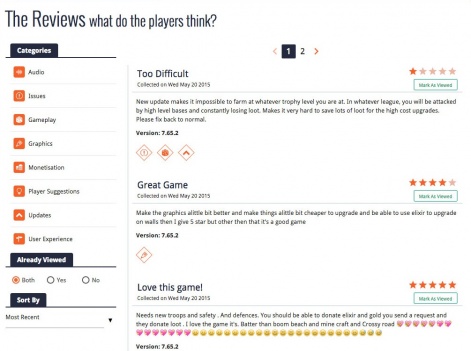The user review is a powerful tool in the realm of free-to-play mobile games.
With ratings impacting a game's visibility on any app store, the players' first impression of it, and even the likelihood of it being featured, developers' keenness to encourage such feedback is understandable.
But to what extent are the individual comments of user reviewers taken on board by developers, and is that even a feasible option in cases where feedback is delivered in great volume?
Attempting to address this is the Cornwall, UK-based company Hertzian, with its game-specific user review aggregation platform PlayerXP.
PocketGamer.biz reached out to Garry Barter, the firm's CEO and co-founder, to get the lowdown.
PocketGamer.biz: Tell us a little about Player XP, and the story behind it.
Garry Barter: Player XP is the first review aggregation and analysis platform dedicated to mobile games.
By aggregating over 40 million reviews from more than 250,000 iOS games, Player XP allows game developers a single location to access players opinions from around the globe.
The platform also makes the task of finding actionable points from reviews easier by utilising advanced analytics technology to identify reviews containing constructive feedback.
We found that the task of collecting and finding actionable points from reviews was a near impossible one, and as such Player XP was born.Garry Barter
This means less of ‘this game is great’ and more of ‘this game is great because…’. Each review in our platform has been automatically assigned a subject matter allowing our users to filter their reviews by topic, version number, country of origin and star rating.
Player XP has been built by Hertzian, a new technology company in Cornwall which specialises in understanding large quantities of customer opinions through the use of technology.
As a team of passionate gamers, and with backgrounds in the academic study of games development, we identified the potential of utilising our knowledge to help game developers understand their players more than they’re currently able to.
Through communication with mobile game developers and researchers, we found that the task of collecting and finding actionable points from reviews was a near impossible one, and as such Player XP was born.
Why do you feel your game-specific approach is so crucial?
The key part of Player XP is that it’s focused purely on reviews of games. That’s because we believe that a more focused approach to the reviews will lead to stronger results when running data through our system.
Being able to assign key categories that relate to the games industry means that we can identify and tag reviews that contain constructive feedback.
We believed that only aggregating reviews from multiple territories wasn’t enough for our users; to make the tool an essential part of a games support, the ability to filter based on topic was essential.

The advancements in Machine Learning and AI, as demonstrated by AlphaGO’s recent success, means that we are now in the position where these techniques can be made available to the public and Player XP is one of the first to do this.
By utilising this technology, we differentiate ourselves from our competitors, instead of only aggregating reviews, we can provide an insight into players that hasn’t been possible before.
How important do you consider user reviews to be?
We believe that the best way to react to changes in a game is by listening to your audience first.Garry Barter
Whilst we’ve been developing Player XP we’ve been attending a number of mobile conferences and have heard the same speech numerous times, ‘this tool will help you track your players doing x’.
This may be true, but we believe it’s actually simpler than that. We believe that by listening to your players you will build a better game.
We believe that the best way to react to changes in a game is by listening to your audience first.
If you release an update that breaks something deep in your game, your players will be the ones that find it, and they’ll want to tell you about it.
This is why monitoring user reviews should be crucial for any game with a strong user base.
What do you define as an 'unhelpful' review, and how exactly are they detected?
This is something we get asked a lot. We see ‘unhelpful’ reviews as a review that doesn’t contain any constructive feedback for the game developer.
We’re not saying that all the other reviews should be completely ignored, but for the use of Player XP, they are classed as ‘unhelpful’. The purpose of Player XP is to make finding actionable points from your users easier - if a review doesn’t contain constructive feedback, then it isn’t displayed.
We utilise Machine Learning and Natural Language Processing (NLP) to detect reviews that contain constructive feedback.
For those unaware of Machine Learning, it’s the idea of feeding large amounts of data through to a single machine to train that machine to recognise patterns amongst the data.
If you consider Google’s AlphaGo system, which recently beat a human at the board game Go, a simple way to look at it is that it did this by knowing every possible move. This was done by training the computer by studying tens of thousands of Go moves.
If you combine Machine Learning with NLP, you can start to detect patterns amongst user feedback - and that’s what Player XP does.
Your company arose from an incubation programme at Falmouth University. How important, especially in areas not known for their technology industry, do you consider these sorts of programmes to be?
Programmes like the Launchpad programme are essential for areas like Cornwall.
As you mentioned, Cornwall isn’t known for it's technological impact and whilst their are a few companies already here trying to change that, programmes like the one at Falmouth University can dramatically accelerate the growth of the technology industry in Cornwall.

In the past 6 months, 6 new companies have launched in the county from the programme, all of them working inside the games industry, and this has allowed a community to grow that are already engaging with other businesses in the area.
We believe Cornwall is on its way to becoming a technology hub and we’re very proud to be a part of it.
What are your plans to improve upon the existing PlayerXP, and how will you seek to attract major mobile developers to use your service?
We believe Cornwall is on its way to becoming a technology hub.Garry Barter
We have a number of ideas on how to improve Player XP. The next feature to be available to our users will be a breakdown of the bugs mentioned inside the reviews, this feature utilises a different part of our technology which summarises multiple reviews to present the most common bugs being talked about.
We have a number of other new features in the works, including sentiment analysis, translation of other app stores and new data sources including Google Play.
There is so much data available on the Play store and we believe by bringing both app stores together, we’ll be able to offer a truly unique service.
We believe that by integrating these features with our existing platform, Player XP will become the go to place for all mobile game developers looking to understand their players.
You can find out more about Player XP on its website.






















